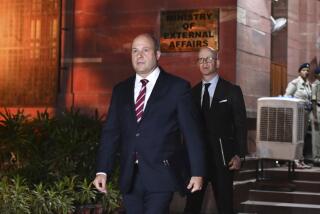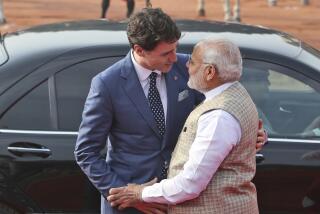Canada Regrets Giving Iraqi Envoy Residency : Diplomacy: But officials deny that Washington had any role in allowing the move by Mohammed Mashat.
- Share via
TORONTO — The mysterious arrival in Canada of Iraq’s former ambassador to the United States has led to suspicion here of a secret deal between Ottawa and Washington--and to red faces among Canadian Cabinet ministers who now say they should have kept the Iraqi out.
Officials here say they made a mistake in letting Mohammed Mashat move to Canada, but they deny that Washington pushed them to do it.
“There have been no hidden motives, no espionage capers, no conspiracies by any individual, either Canadian or foreign,” said Immigration Minister Bernard Valcourt.
In March, Mashat received permanent residency status in Canada--a status much coveted by impoverished and persecuted people throughout the Third World. Viewers of American network television are apt to recall Mashat, who appeared frequently on TV in the months before the Gulf War, defending Iraq’s invasion and annexation of Kuwait.
Since Canada sent a small contingent of sailors and airmen to help wage war against Saddam Hussein’s Iraq, it has outraged many here that a chief apologist for the regime has now been given the right to live in this country.
Compounding their anger has been the speed with which Mashat gained his admission. A routine, garden-variety refugee claimant from the Third World generally spends months or years wending his way through the Canadian immigration bureaucracy. Mashat made it in a matter of weeks.
To annoy Canadians further, Canada’s ministers of foreign affairs, immigration and justice, as well as the solicitor general--all of whom should have known about Mashat’s application for Canadian residency--have denied hearing of his application until the diplomat had already been given a visa. By that time, the ministers maintain, it was too late to stop him.
Mashat was no longer in Washington by the time the United States and its allies were dropping their bombs on Baghdad. Iraq recalled him one day before the air strikes began last January. He headed for Iraq, but made it only as far as Vienna, where he says his wife fell ill and was unable to travel the rest of the way.
In February, Mashat went to the Canadian Embassy in Vienna and requested a visa. A few weeks later, it was granted under a special program for foreign retirees.
Mashat arrived in Vancouver and bought a modest, aluminum-clad duplex. But before he had a chance to move in, Canadian photographers and reporters were stalking the lawns, snapping pictures and dismaying the security-conscious neighbors. There has already been at least one bomb threat.
In a press conference Tuesday, Immigration Minister Valcourt and Foreign Minister Barbara McDougall claimed that senior staffers had put Mashat on a visa fast track without telling their superiors.
“Mistakes were made, mistakes in the processing of this case, errors in judgment, and a major error in that officials failed to ensure that ministers were consulted or even informed,” Valcourt said.
Opposition politicians scoffed at the ministerial statements, saying senior officials were using humble bureaucrats as scapegoats. The explanations have not quashed suspicions in Canada that it was Washington--and not just a few senior staffers--that brought about Mashat’s remarkably smooth and quiet entry into Canada.
One popular theory has it that Mashat has been supplying intelligence to Washington--and perhaps to Canada, too--and that grateful American officials won him safe passage to Canada as compensation. The Canadian Security Intelligence Service, however, firmly denies any involvement with its American counterpart, the CIA, on the Mashat matter.
Another theory holds that Washington sees the U.S.-educated Mashat as a friendly potential successor to power in Iraq, should Saddam Hussein ultimately fall. Indeed, Mashat has strong personal connections with the United States: His first wife and five children, plus a son from a second marriage, are all still living there, and a U.S. government official reportedly saw him off at the airport when he left Washington.
With this in mind, some Canadians think that American officials may have wanted to keep Mashat handy in Canada for quiet reinsertion into the Iraqi political scene at an opportune moment.
The State Department denies helping Mashat get his Canadian visa.
Mashat, meanwhile, has been telling Canadian interviewers that he wants to “start a new life as a retiree” in this country “as a simple man, (like) any other citizen.” He put his unpretentious Vancouver house back on the market this week, just two weeks after he bought it, apparently because he was uncomfortable with all the attention he has been attracting.
More to Read
Sign up for Essential California
The most important California stories and recommendations in your inbox every morning.
You may occasionally receive promotional content from the Los Angeles Times.













